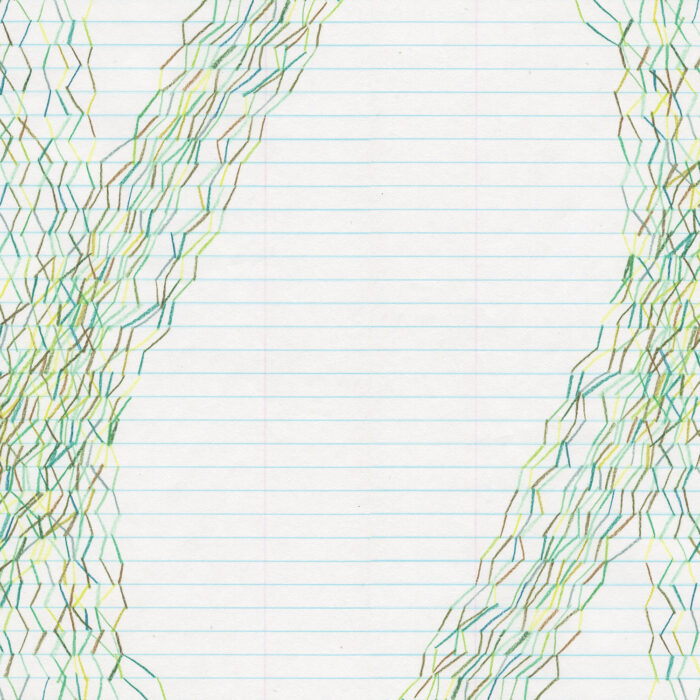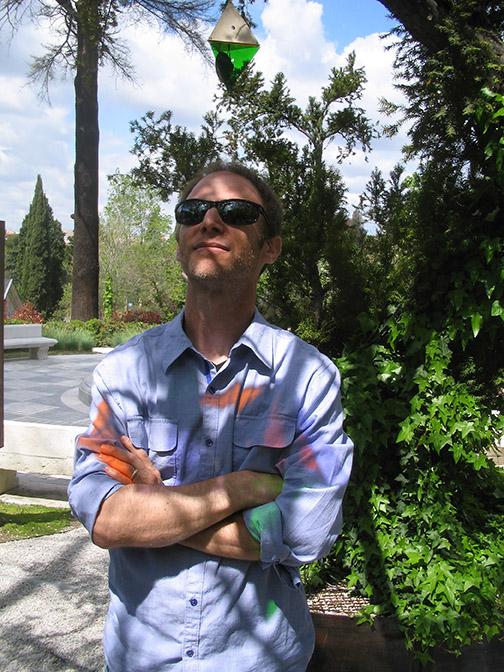STEVE RODEN (1964-2023)
Steve centered his life upon the making of connections and meaning by experimenting with visual imagery, music, language, code, translation, listening, and the amassing of various collections of objects and ephemera. In a KCET Artbound interview with Sharon Mizota from 2012, he shared, “It’s a very personal way of moving through the world to connect things that really weren’t meant to be connected.” Steve built his life in much the same way as he constructed his visual musical scores or his paintings, drawings, collages, sound installations, and films. He thoughtfully translated his intimate observations of the “unnoticed” things in his environment or another artist, writer, philosopher, architect, or musician’s work and made something new-always bringing the past forward, personalizing his conversation with the material, and churning it into a poetic and relevant aesthetic experience for the present. In a recent email exchange with Fulcrum Arts Executive Director Robert Crouch, he shared “Steve could create a simple set of rules, inspired by the most humble and mundane materials, and through his process, create and share something utterly gorgeous, unique, and transcendent.”
Since 1986, Steve consistently exhibited and performed his work in the United States and abroad. His artwork is held in many public and private collections including Los Angeles County Museum of Art, Museum of Contemporary Art in Los Angeles and San Diego, and National Museum of Contemporary Art in Athens, Greece. Steve was featured in the Hammer Museum’s landmark exhibition “SNAPSHOT: New Art From Los Angeles” in 2001. In 2003, he had his first solo exhibition with his LA gallerist Susanne Vielmetter at her first location on Wilshire Boulevard. Vielmetter plans to present an exhibition of his work in fall 2024. In 2010, the Armory Center for the Arts organized “in between: a 20- year survey” and Pomona College Museum of Art simultaneously mounted “when words become forms.” In his review of these projects, Los Angeles Times Art Critic Christopher Knight wrote, “Looking at a Roden painting, sculpture or projected film, you sense this interaction of formal system and cryptic intuition,” and he likened Steve’s art to the work of Paul Klee, Alfred Jensen, and Arthur Dove.
Throughout his life as Steve’s musical interests expanded from punk and post-punk to electronic, minimalist, and beyond, the artist tuned his attention to listening. Inspired by experimental sound artists and composers like Brian Eno, Meredith Monk, Rolf Julius, and Morton Feldman, Steve developed his own style of music and performing known as “lowercase.” Steve’s vast and impressive discography and landmark releases include “forms and paper” (2001, 2011 Line, and on vinyl 2024 Aurora Central Records); “i listen to the wind that obliterates my traces” (2011, Dust to Digital); and “Oionos” (2022, Room 40), a track originally created for the exhibition “The Grand Promenade” (2006), Athens, Greece. Musician, friend, and producer Lawrence English expressed, “In this world there are some artists who listen so very deeply, who cherish the minor, the incidental, the unexpected, the hushed; Steve was one such artist.” English elaborates, “Not only did Steve cast his ears outward, with a generosity equaled only by his curiosity, but he asked us to do the same. Together, we leaned into a world of sound so rich that we might not believe it could be possible. Steve not only guided us to and through that world, but he created it.”
Traveling the world to perform in sound art festivals and exhibit at museums and kunsthalles, Steve met and collaborated with many like-minded contemporaries including Steve Peters, Doug Aiken, Stas Orlovski, Michael Ned Holte, Michael Raphael, Alexandra Grant, Simone Forti, John David O’Brien, Toti Mercadante, Alison O’Daniel, Jeffrey Roden, and others. Visual and sound artist Stephen Vitiello, who performed with Steve in the Rothko Chapel in Houston, and in a Donald Judd desert installation for the “Marfa Sessions” exhibition (2008), recalls a recent and personal moment, “What I’ll remember for the rest of my life is my last visit with Steve. He was deep into the illness, and he seemed to have stopped making music and logic was slipping. He wanted me to see his father’s guitar. We spontaneously started to jam and played for a whole hour. His guitar was out of tune, but he was actively listening and responding. He managed to retain his singular sound and make something strangely beautiful and deep.”
Having a penchant for archives, ephemera, and the work of deceased 19th and 20th century artists, poets, and philosophers, Steve dug through notes, old letters, catalogs, manuscripts, and sketchbooks to look for ways to have an aesthetic conversation with the likes of Walter Benjamin, John Cage, Par Lagerkvist, Rainer Maria Rilke, and Harry Bertoia. In 2008, curator and former LACE director, Carol Stakenas, collaborated with Steve and the Getty Research Institute in partnership with the Museum of Contemporary Art in Los Angeles on a re-invention of Allan Kaprow’s seminal “18 Happenings in 6 Parts,” originally presented in 1959 at the Reuben Gallery in New York. Stakenas had this to say, “What made working with Steve on 18/6 remarkable was how it brought us into the generative/creative space . . . full of improvisation, curiosity, and presence. Regularly, I re-read the letter he wrote for the event program ‘dear mr. kaprow (an approach to 18 happenings in 6 parts).’ Now, when I read the text, this line of Steve’s stands out. . . ‘i think your work suggests that struggle only gets you to the starting point, while an open mind is needed to truly embark upon the journey.'”
Steve Roden leaves behind a prolific and profound body of work. In the 2012 Artbound segment he speaks about the making of art as a learning process and the only way to do it is by experimentation and failure. He also says, “. . . painting is like the sun and all of the other media hover around it.” Glenn R. Phillips, Senior Curator at the Getty Research Institute, has commented, “Steve Roden had that wide-ranging curiosity and joy in experimentation that all great artists have. At the heart of his work is an incredible sense of play that can delight in taking an idea from the mind to the page, to the canvas, into sound, into space, and then back to the mind again. He understood the beauty of slowing down and allowing an experience to fully work its way through the body and the self.”
inbetweennoise.com


